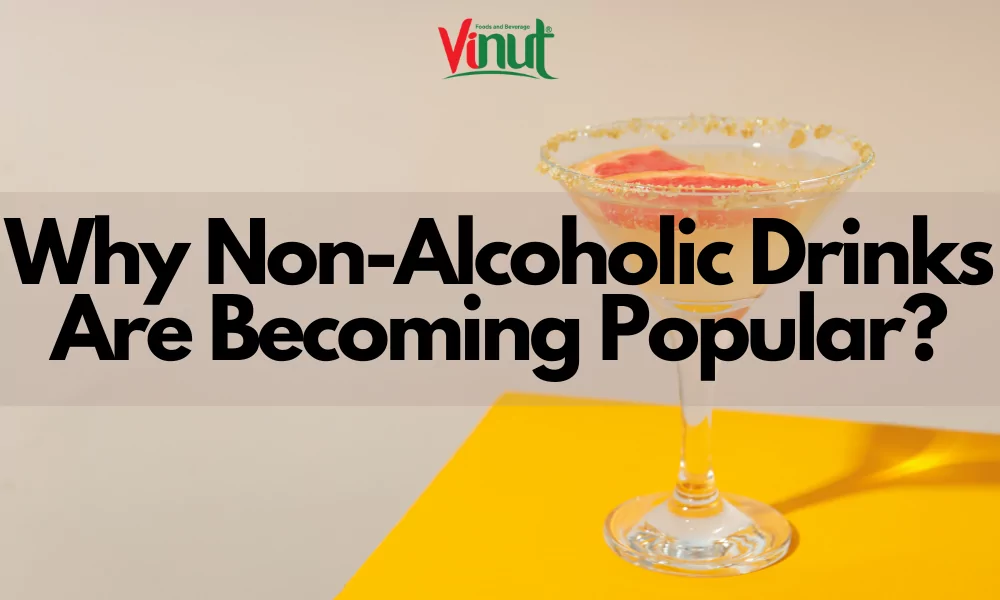Why Non-Alcoholic Drinks Are Becoming Popular?

Summary
A remarkable shift in the beverage industry has recently occurred, with non-alcoholic drinks gaining unprecedented popularity. This trend reflects changing societal attitudes, evolving consumer preferences, and a growing emphasis on health and wellness. As more individuals seek alternatives to traditional alcoholic beverages, the market for non-alcoholic options has expanded dramatically, offering a diverse array of innovative and flavorful choices.
This article explores the factors driving the rise of non-alcoholic drinks, examining the cultural, social, and economic forces shaping this phenomenon.
The Rise of Health Consciousness
The surge in popularity of non-alcoholic drinks is inextricably linked to a broader societal trend towards health consciousness. As people become more aware of the impact their lifestyle choices have on their overall well-being, many are reassessing their relationship with alcohol and seeking healthier alternatives. This shift in mindset has created a fertile ground for the growth of the non-alcoholic beverage market.

Changing Attitudes Towards Alcohol
The traditional perception of alcohol as a necessary component of social interactions and celebrations is undergoing a significant transformation. Younger generations, in particular, are challenging long-held assumptions about the role of alcohol in their lives.
Many individuals are now prioritizing their physical and mental health, recognizing the potential negative effects of excessive alcohol consumption. This heightened awareness has led to a reevaluation of drinking habits and a greater openness to non-alcoholic alternatives.
Impact of Social Media on Drinking Habits
Social media has also facilitated the spread of information about the health risks associated with excessive alcohol consumption. Users can easily access and share content about the potential negative effects of alcohol on physical and mental health, further encouraging a shift towards non-alcoholic alternatives.
Innovative Non-Alcoholic Alternatives
Craft Non-Alcoholic Drinks
The craft beverage movement, which initially focused on artisanal beers and spirits, has expanded to embrace non-alcoholic options. This shift has resulted in a proliferation of high-quality, craft-produced non-alcoholic beverages that cater to discerning palates.

Craft non-alcoholic beers have seen significant advancements in recent years. Brewers have developed innovative techniques to create alcohol-free beers that closely mimic the flavor profiles of traditional craft beers. These beverages often feature complex hop aromas, balanced malt flavors, and satisfying mouthfeel, providing a genuine craft beer experience without the alcohol content.
The Role of Mixology in Non-Alcoholic Drinks
The art of mixology has played a crucial role in elevating non-alcoholic drinks from simple mocktails to sophisticated, carefully crafted beverages. Bartenders and mixologists around the world have embraced the challenge of creating alcohol-free drinks that rival the complexity and appeal of traditional cocktails.

This focus on mixology has led to the development of intricate non-alcoholic drink recipes that incorporate a wide range of ingredients, including herbs, spices, fruits, and even smoke or foam elements. These drinks often feature layered flavors, balanced acidity, and innovative presentations that make them visually appealing and satisfying to consume.
Many high-end bars and restaurants now offer dedicated non-alcoholic drink menus, showcasing the same level of creativity and attention to detail found in their alcoholic cocktail offerings. This commitment to quality and innovation in non-alcoholic mixology has helped change perceptions about alcohol-free drinks, positioning them as premium options rather than afterthoughts.
Expanding Market Options
The growing popularity of non-alcoholic drinks has led to a significant expansion of market options, with an increasing number of brands and products catering to this burgeoning segment. This proliferation of choices has made it easier than ever for consumers to find non-alcoholic alternatives that suit their tastes and preferences.

Availability and Variety
The variety of non-alcoholic options has expanded dramatically, covering a wide range of beverage types. Consumers can now choose from an array of non-alcoholic beers, including lagers, ales, stouts, and even craft-style brews. The wine category has seen the introduction of de-alcoholized wines, as well as sophisticated non-alcoholic alternatives that mimic the complexity of traditional wines.
In addition to these traditional beverage categories, there has been a surge in innovative non-alcoholic drinks that don’t fit neatly into existing categories. These include botanical-infused sparkling waters, adaptogenic beverages, and functional drinks that offer specific health benefits.
The rise of ready-to-drink (RTD) non-alcoholic cocktails has also contributed to the expanding market options. These pre-mixed beverages offer convenience and consistency, allowing consumers to enjoy complex, mixologist-quality drinks without the need for extensive preparation or specialized ingredients.
Targeting Different Demographics
Young adults, particularly millennials and Gen Z, have been key drivers of the non-alcoholic trend. Many in these generations are more health-conscious and mindful of their alcohol consumption than previous generations. Non-alcoholic drink manufacturers have responded by creating products that appeal to this demographic’s desire for unique experiences and Instagram-worthy presentations.
Health-conscious consumers across all age groups are another important target for the non-alcoholic market. Many brands are positioning their products as part of a healthy lifestyle, emphasizing natural ingredients, low-calorie counts, and potential health benefits. This approach appeals to individuals looking to reduce their alcohol intake for health reasons without sacrificing the enjoyment of sophisticated beverages.
The rising popularity of non-alcoholic drinks represents a significant shift in consumer preferences and societal attitudes towards alcohol consumption. Driven by a combination of health consciousness, changing social norms, and innovative product development, the non-alcoholic beverage market has evolved from a niche segment to a thriving industry.


 Juice Concentrate
Juice Concentrate Vegetable juice
Vegetable juice Juice Milk
Juice Milk Stand Up Pouches
Stand Up Pouches









